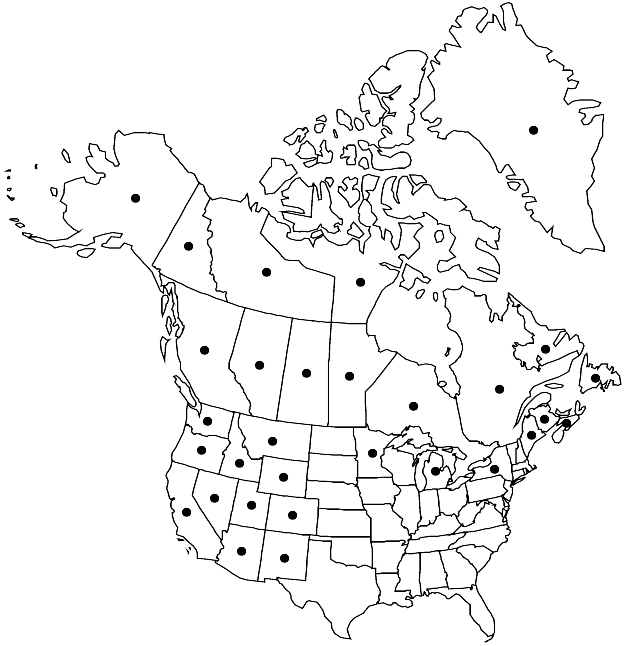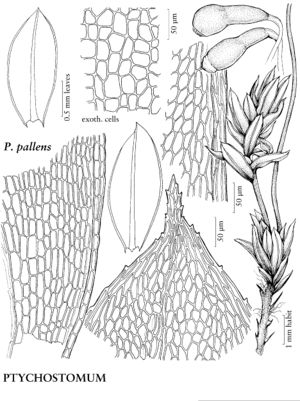Difference between revisions of "Ptychostomum pallens"
Phytologia 87: 21. 2005.
FNA>Volume Importer |
FNA>Volume Importer |
||
| Line 30: | Line 30: | ||
|elevation=low to high elevations (0-3000 m) | |elevation=low to high elevations (0-3000 m) | ||
|distribution=Greenland;Alta.;B.C.;Man.;N.B.;Nfld. and Labr.;N.W.T.;N.S.;Nunavut;Ont.;Que.;Sask.;Yukon;Alaska;Ariz.;Calif.;Colo.;Idaho;Maine;Mich.;Minn.;Mont.;Nev.;N.Mex.;N.Y.;Oreg.;Utah;Wash.;Wyo.;s South America;Eurasia. | |distribution=Greenland;Alta.;B.C.;Man.;N.B.;Nfld. and Labr.;N.W.T.;N.S.;Nunavut;Ont.;Que.;Sask.;Yukon;Alaska;Ariz.;Calif.;Colo.;Idaho;Maine;Mich.;Minn.;Mont.;Nev.;N.Mex.;N.Y.;Oreg.;Utah;Wash.;Wyo.;s South America;Eurasia. | ||
| − | |discussion=<p>Ptychostomum pallens is a highly variable arctic-boreal to north-temperate species, related to P. cernuum, P. meesioides, and P. rutilans. The pale pink color is diagnostic but not always present. The species is distinguished from P. rutilans by its much thinner walled non-porose laminal cells and well-developed peristome; from P. meesiodes by its shorter, less arcuate capsule and short exothecial cells; and from P. cernuum by its dioicous sexual condition. The plants have red to red-brown leaf costae.</p> | + | |discussion=<p><i>Ptychostomum pallens</i> is a highly variable arctic-boreal to north-temperate species, related to <i>P. cernuum</i>, <i>P. meesioides</i>, and <i>P. rutilans</i>. The pale pink color is diagnostic but not always present. The species is distinguished from <i>P. rutilans</i> by its much thinner walled non-porose laminal cells and well-developed peristome; from P. meesiodes by its shorter, less arcuate capsule and short exothecial cells; and from <i>P. cernuum</i> by its dioicous sexual condition. The plants have red to red-brown leaf costae.</p> |
|tables= | |tables= | ||
|references= | |references= | ||
| Line 54: | Line 54: | ||
|publication year=2005 | |publication year=2005 | ||
|special status=Selected by author to be illustrated | |special status=Selected by author to be illustrated | ||
| − | |source xml=https://jpend@bitbucket.org/aafc-mbb/fna-data-curation.git/src/ | + | |source xml=https://jpend@bitbucket.org/aafc-mbb/fna-data-curation.git/src/8f726806613d60c220dc4493de13607dd3150896/coarse_grained_fna_xml/V28/V28_274.xml |
|genus=Ptychostomum | |genus=Ptychostomum | ||
|subgenus=Ptychostomum subg. Ptychostomum | |subgenus=Ptychostomum subg. Ptychostomum | ||
Revision as of 17:04, 18 September 2019
Plants in dense or open turfs, pale pink, red, or rarely dull green. Stems 1–4(–6) cm, fertile stems comose, innovations evenly foliate. Leaves pink, red, or rarely green, crowded, contorted to shrunken when dry, ovate to broadly ovate-lanceolate, flat or weakly concave, 1–3.5(–4) mm, often gradually enlarged toward stem apex; base pink or green, somewhat to strongly and narrowly decurrent; margins revolute proximally, plane distally, limbidium strong, in 2 or 3 rows; apex acuminate; costa percurrent to short-excurrent, awn stout; proximal laminal cells short-rectangular, 2–3(–4):1; medial and distal cells 17–24 µm wide, 2–3:1, walls thin, not porose. Specialized asexual reproduction rare, by leaf axil gemmae, brown-red to green, finely papillose. Sexual condition dioicous. Seta red-brown, 2–4(–6) cm, stout, straight to somewhat flexuose. Capsule yellow-brown, elongate-pyriform to clavate, somewhat curved, (3–)4–5 mm, mouth yellow-brown; median exothecial cells short-rectangular to quadrate, 20–40 µm, 1–2:1; operculum conic, apiculate; peristome usually well developed; exostome teeth yellow basally, hyaline distally, lamellae straight, pores absent near base along mid line; endostome not adherent to exostome, basal membrane 1/2 exostome height, segments with ovate perforations, cilia appendiculate to nodose, occasionally short. Spores 16–20(–22) µm, yellow to green.
Phenology: Capsules mature Jun–Sep.
Habitat: Wet soil, along streams, wetlands, calcareous
Elevation: low to high elevations (0-3000 m)
Distribution

Greenland, Alta., B.C., Man., N.B., Nfld. and Labr., N.W.T., N.S., Nunavut, Ont., Que., Sask., Yukon, Alaska, Ariz., Calif., Colo., Idaho, Maine, Mich., Minn., Mont., Nev., N.Mex., N.Y., Oreg., Utah, Wash., Wyo., s South America, Eurasia.
Discussion
Ptychostomum pallens is a highly variable arctic-boreal to north-temperate species, related to P. cernuum, P. meesioides, and P. rutilans. The pale pink color is diagnostic but not always present. The species is distinguished from P. rutilans by its much thinner walled non-porose laminal cells and well-developed peristome; from P. meesiodes by its shorter, less arcuate capsule and short exothecial cells; and from P. cernuum by its dioicous sexual condition. The plants have red to red-brown leaf costae.
Selected References
None.
